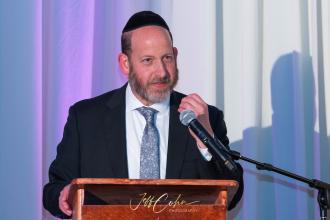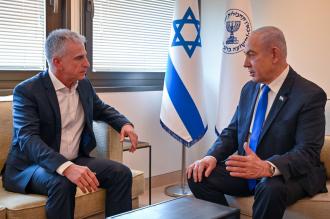The establishment of a safe zone for civilians in southern Syria would benefit the national security of both the US and Israel, the head of an American Jewish non-profit group that provides humanitarian aid to Syrians told The Algemeiner on Thursday.
Israeli-American businessman and activist Moti Kahana — who founded the New York City-based NGO Amaliah — said the Israeli government has done an “amazing job” in enabling his organization to achieve its goal, which he said was to assist Syrians in rebuilding civil society in their country.
“People around the world are saying, ‘We don’t want Syrian refugees,’” Kahana said. “Well, the Syrians don’t want to be refugees. We can help them help themselves, and we can start in the southern part of Syria, near the borders with Israel and Jordan.”
He continued: “We’re telling people, ‘Come back home. We will bring you water, electricity, schools and field hospitals. Help us to rebuild your own villages.’ It’s about the Syrian people taking their own lives back into their own hands. But they need outside supplies to help them. Otherwise, how are they going to do it?”
While Kahana was full of praise for Israeli cooperation with is endeavor, he said the US was hesitant to get involved.
“I don’t get the support from the American government that I get from the Israelis, unfortunately, and I don’t understand this,” Kahana — a self-described Democrat who voted for President Barack Obama — said. “The Americans know exactly what I’ve been doing. But the only thing I get from them is, ‘Oh, that’s a good idea.’”
The US, Kahana declared, has “no Syria policy.”
“America lost all credibility in the region when Obama removed his red line,” Kahana stated, referring to the US president’s decision not to strike the Assad regime in 2013, after it used chemical weapons.
Kahana said most of the supplies his group gives to Syrians are bought in Israel. He declined to go into detail about how the goods are transferred to their destination.
“Clearly they don’t enter from Mexico,” he quipped. “As I always say, God works in mysterious ways.”
Just a few weeks ago, Kahana said, one ton of kosher meat was transported. “The Syrians were ok with getting it from an American group, even though they knew it was coming from Israel.”
Kahana called Syrians “wonderful people,” but said they were still cautious about being associated with the Jewish state.
“Inshallah [“God willing,” in Arabic], we will roast marshmallows around the camp fire one day, but until then let’s understand what they need and work with them,” Kahana said. “Bridges are built slowly, not quickly.”
He predicted that, if successful in protecting civilians, his proposed safe zone in southern Syria would serve as an example that would be immediately emulated in the northern part of the country, near the Turkish border.
Kahana said his motivation stemmed from a trip he made to the Yad Vashem Holocaust Memorial Museum in Jerusalem five years ago, and his own family’s Holocaust history in Romania.
“I decided the time had come to be a human being,” he said. “Unfortunately, history is repeating itself, with governments killing their own people, and nobody cares.”
Linking the current plight of the Syrian people to the suffering faced by Jews during their 2,000 years of exile, Kahana said, “We Jews fought to return to Jerusalem, and we did it. The Syrian people will not give up. This is their home. This is where they want to live.”
Antisemitism experts disagree, however, on whether comparing the crisis in Syria to the Holocaust is legitimate. Manfred Gerstenfeld, author of The Abuse of Holocaust Memory: Distortions and Responses, told The Algemeiner last week that doing so is “radically wrong,” claiming:
Most or all of the key elements of the Holocaust pointed out by a variety of top scholars do not apply to the horrible Syrian war and its carnage. What is central to the Holocaust is that never before — nor since — had a state aimed at murdering systematically all members of a certain ethnicity, wherever they were in the world. None of the parties in the Syria war even remotely aim at something similar. The Holocaust was a genocidal program carried out systematically and — however horrible it sounds — “efficiently.” There is no similar systematic and “efficient” program by anybody in Syria, not even ISIS.
In contrast, Ben Cohen, author of Some of My Best Friends: A Journey Through Twenty-First Century Antisemitism, said that “the Holocaust has frequently and rightly been invoked when subsequent genocides and mass killings are ignored.” However, he told The Algemeiner:
When the Holocaust was at its height, the US was already involved in World War II, whereas in Syria, the Obama administration has pursued appeasement. On the other hand, ending the Holocaust was not an immediate Allied war aim; and in Syria, this administration has been clear that continued diplomacy with Russia and Iran is more important than stopping the horrors in Aleppo. So while these are two distinct events — with the Holocaust, the ultimate goal of the Nazi dictatorship was to eliminate all Jews, everywhere — what links them is the fact that when it comes to America’s strategic calculus, stopping genocide and mass slaughter is about where it was in 1945.















